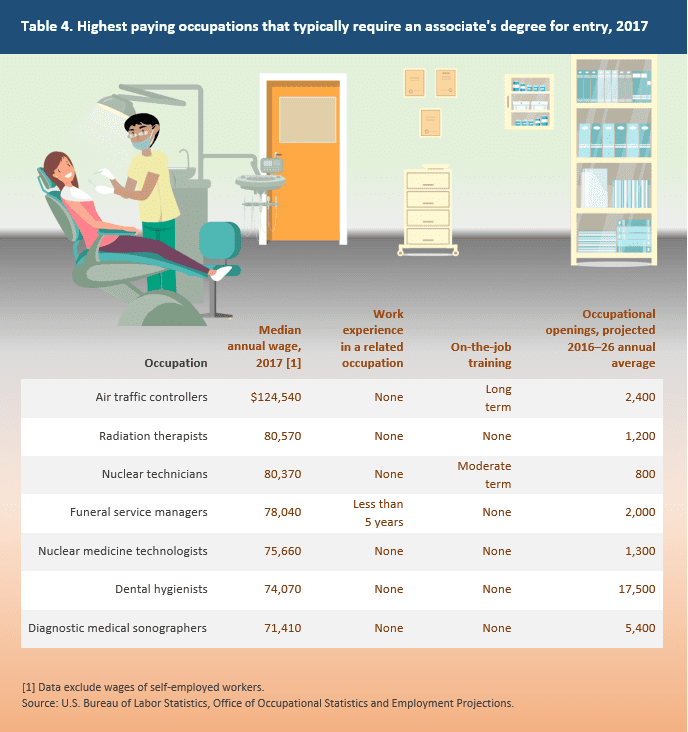You may have heard of an AA or an AS degree but don’t quite understand the difference. After all, both Associates of Arts and Associate of Science degrees are two-year degrees, right? So what sets them apart? Read on to learn more about the key distinction between these two types of associate degrees.
AA vs. AS Degree Explained
Both AA and AS degrees are two-year programs that can be completed at a community college, technical school, or online college. The main difference between these two types of associate degrees is in the focus of the coursework.
An AA degree is a liberal arts degree. This means that the coursework is designed to give you a well-rounded education without specializing in any particular area.
An AA degree covers a broad range of topics, including English, math, science, social sciences, and humanities.
An AS degree is a more specific degree that focuses on preparing you for a particular career or transferring to a four-year university to complete a bachelor’s degree.
For example, if you want to be an engineer, you would earn an AS in engineering. Other common AS degrees include computer science, nursing, and pre-med.
Difference Between an AA and AS Degree
An Associate of Arts (AA) degree is a two-year degree typically awarded by community colleges and junior colleges. The AA degree is considered a general studies degree and can be transferred to a four-year college or university.
An Associate of Science (AS) degree is also a two-year degree but focuses more on math and science courses. AS degrees are typically offered at technical colleges and subjects, often leading to careers in specific fields, such as engineering or nursing.
Overall, the primary difference between an AA and AS degree resides in the subject matter and material each degree focuses on. AA degrees focus on liberal arts and subjects in the humanities, while AS degrees focus on more technical skills and subjects (i.e., engineering, chemistry, etc.).
Recommended Reading: When do UC Decisions Come Out? Announcing 2023 UC Decision Dates
Which is Better to Have an AA or AS Degree?
The debate between getting an AA or AS degree has been around for a while. Some people believe an AA degree is better because it is cheaper and faster.
Others argue that an AS degree is better because it provides more job opportunities. There is no clear answer, and the best choice depends on each individual’s situation.

For example, someone who is looking to enter the workforce as quickly as possible may be better off with an AA degree. On the other hand, someone who is looking for a specific career may find that an AS degree gives them a leg up in the job market.
Ultimately, the decision between an AA and AS degree comes down to what is best for the individual student.
What Are The Benefits of an AA and AS Degree?
When considering which associate degree to pursue, it is important to evaluate the benefits of each type of degree.
The most obvious difference between an Associate of Arts and an Associate of Science is the emphasis on liberal arts courses versus science and math courses. However, a few key benefits can help you decide which degree is right for you.
An Associate of Arts degree is typically two years in length, making it a shorter commitment than an Associate of Science. In addition, an Associate of Arts degree can be a good foundation for further study in a number of fields, including education and business.

On the other hand, an Associate of Science degree can provide greater freedom in choosing courses and more career-focused training that can lead to higher-paying jobs.
Ultimately, the best decision depends on your long-term goals and interests. By carefully considering the benefits of each type of degree, you can make sure that you choose the associate’s degree that is right for you.
What Types of Jobs Can You Get With an AA or AS Degree?

There are a variety of jobs that you can get with an Associate’s degree. The fields and occupations you enter can change depending on if you get an AA or AS degree. Both an AA and AS degree provide opportunities that would not otherwise be made available.
Jobs You Can Get With an AA Degree
Many people use an AA degree as a stepping stone to a bachelor’s degree, but there are also many jobs that only require an AA.
For example, you could become a registered nurse, a dental hygienist, or a radiologic technologist. You could also work in a variety of administrative roles, such as an office manager or a human resources coordinator.
If you’re interested in working with children, you could become a kindergarten teacher or a childcare worker. And if you’re looking for a job in the criminal justice system, you could work as a probation officer or a paralegal.
As you can see, there are many different types of jobs that you can get with an AA degree. So if you’re looking to start your career, an AA degree is a great place to start.
Jobs You Can Get With an AS Degree
An Associate of Science degree can open the door to a variety of careers. Common AS degrees include biology, computer science, and engineering majors.
With an AS degree, you can find healthcare, technology, and education jobs.
For example, you could become a registered nurse, a web developer, or a laboratory technician. Or, if you’re interested in pursuing a bachelor’s degree, you can use your AS degree as a stepping stone.
Many colleges and universities offer programs that allow students with an AS degree to transfer their credits and complete a bachelor’s degree in two years or less.
So whether you’re looking for an entry-level position or a path to further education, an Associate of Science degree can give you the foundation you need to succeed.
Job Prospects Increase with an AA and AS Degree
Both an AA and an AS can open up a wide range of job opportunities. With an AA or AS degree, you can qualify for many entry-level positions in various industries.
For example, you could work as a customer service representative, office administrator, or retail sales associate.
You can also find work in the healthcare field as a medical assistant or certified nurse assistant. In addition, an AA or AS degree can provide a strong foundation for further education if you decide to pursue a bachelor’s degree at some point.
Overall, an AA or AS degree can give you the skills and knowledge you need to start your career and continue learning throughout your life.

How Long Does it Take to Get an AA and AS Degree?
How long does it take to get an Associate’s degree? The answer depends on a few factors, including the type of degree you’re pursuing and whether you’re attending school full- or part-time.
Typically, an AA and AS degree can be earned in two years if you’re attending full-time. Completing your degree may take a bit longer if you’re going to school part-time. The good news is that many community colleges offer flexible scheduling options that can help you fit your coursework into your busy life.
So if you’re wondering how long it will take to earn an Associate’s degree, the answer is that it all depends on your individual circumstances. Both the AA and AS are two-year programs, but the AS pathway is more difficult considering the type of technical courses a student is taking.
Therefore, it is not uncommon for AA degree holders to finish quickly because they can take 16 units per semester of coursework, which is relatively mundane in comparison to the workload of 16 units for an AS degree holder.
What are the Requirements for Each AA and AS Degree?
An Associate of Arts degree typically takes two years to complete. Students must complete at least 60 credit hours, maintain a minimum GPA of 2.0, and complete 18 credits related to their chosen major in order to graduate.
An Associate of Science degree also usually takes two years to finish, but the specific requirements may vary depending on your school. Generally, you will need to complete at least 60 credit hours, maintain a minimum GPA of 2.0 and earn 18 credits related to your major in order to graduate with an AS degree.
In addition, both types of degrees require applicants to be at least 18 years old on the first day of class and have either a high school diploma or GED.
So if you’re interested in pursuing an Associate’s degree, check with your school to see the specific requirements. With a little bit of hard work and dedication, you can get your degree and be well on your way to achieving your career goals!
What Benefits Come with an Associate’s Degree?
An Associate’s degree provides many great benefits. With an AA or AS, you will have a higher chance of finding employment in your chosen field and be better equipped to handle the challenges that come with it. You’ll also gain valuable experience that can help you advance professionally and set yourself apart from other job seekers.
Additionally, an Associate’s degree can provide a great foundation for furthering your education. Many schools offer programs that allow students with an AA or AS degree to transfer their credits and complete a bachelor’s degree in two years or less.
Overall, if you’re looking to start your career strong, an Associate’s degree is the perfect way to do it. With the right dedication and preparation, you can get your degree and begin your journey toward success! Good luck!
What’s the Difference Between An Associate’s Degree, a Bachelor’s Degree, and a Master’s Degree?
The main difference between an associate’s degree, a bachelor’s degree, and a master’s degree is the level of education you will receive.
An associate’s degree is typically two years of full-time study and will give you a basic foundation in your chosen field.
A bachelor’s degree is four years of full-time study and will give you a more in-depth understanding of your chosen field.
A master’s degree is typically two years of full-time study beyond a bachelor’s degree and will give you an even more advanced level of understanding in your chosen field.
The type of job you can get with each degree will vary depending on your chosen field, but generally, a bachelor’s degree or higher will open up more doors in terms of job opportunities.
An associate’s degree holder might have a job as a medical assistant, certified nurse assistant, or administrative assistant. A bachelor’s degree holder might have a job as a registered nurse, teacher, or marketing manager. A master’s degree holder might have a job as a nurse practitioner, college professor, or CEO.
What’s the Difference Between an Associate’s Degree and an Associate for Transfer (AA-T)?
The Associate Degree for Transfer (AA-T) is a specific degree program for students who want to transfer to a four-year institution and complete a bachelor’s degree.
This degree guarantees admission to a four-year college or university and priority consideration for the student’s chosen major. The AA-T also fulfills the lower division requirements at many of the California State University (CSU) and University of California (UC) campuses.
An Associate’s Degree does not guarantee transfer admissions. Still, it may prove beneficial in helping students with their job prospects and is intended for students who want to enter the workforce early and do not have the intention to transfer immediately.
Related: What Is an Associate Degree? Requirements, Costs, and More
It is important to remember that even if you do not receive an associate degree for transfer or an associate degree in general, you are still eligible to transfer to a CSU or UC, you will just have to meet the 60-unit transfer requirements and achieve good grade marks in those classes.
To sum up, the difference between an associate degree and an associate for transfer is that the latter credential is most useful for individuals looking to pursue a bachelor’s degree and want guaranteed admission and priority consideration for their major at a four-year college or university.
In contrast, students who graduate with a more traditional associate’s degree will probably enter the workforce right after they finish their schooling. This is distinct from people who follow other types of education paths. Associate degrees are ideal for people keen on skilled trade work, criminal justice careers, information technology jobs, and nursing positions.
How Many Credits Do You Need For An Associate’s Degree in California?
In order to earn an associate’s degree from a California community college, you must complete a minimum of 60-semester units or 90 quarter units of college-level coursework.
Of these units, at least 48 must be completed at the community college where you are earning your degree. In addition, you must also complete general education requirements in English, math, and other subjects.
Related: Associate Degrees: Credits Needed & Time to Completion
Once you have met all of these requirements, you will be eligible to receive your degree. While the process may seem daunting, remember that you can always ask for help from your academic advisor. They will be able to guide you through the process and make sure that you are on track to graduate.
Difference Between an Associate of Science (AS) vs an Associate of Applied Science Degree (AAS)
The biggest difference between an Associate of Science (AS) and an Associate of Applied Science Degree (AAS) is that the AS degree is a transfer degree. At the same time, the AAS is considered a terminal degree.
An AS degree provides a foundation in academics that can be used to transfer to a four-year institution. At the same time, an AAS prepares graduates for a career after graduation and is not intended for transfer.
AAS degrees are most useful for students who have already decided on the type of career they want to pursue after graduation, such as certified nurse assistant or administrative assistant.
In contrast, an AS degree might be more suitable for those who plan to eventually complete a bachelor’s, master’s, or even doctorate degree.
It is important to note that many community colleges have transfer agreements with four-year institutions, which allow students earning an AS degree to more easily complete the transfer process and meet general education requirements at the new institution.
When choosing between an AS and AAS degree, it is important to consider your long-term goals and whether you want to pursue a career right away or plan to transfer to a four-year school. Both degrees can be beneficial in preparing for the future, so make sure to research all of your options before making a decision.
The AAS degree is a terminal degree that prepares graduates for the workforce, so the curricula were not developed with transferability in mind. Consequently, transferring out of an AAS program is often more difficult than it is for other types of programs.
Conclusion
So which type of associate degree is right for you? That depends on your goals and interests. If you want a well-rounded education that will give you flexibility in your future career choices, then an AA degree might be the right choice for you.
But an AS degree might be a better fit if you have your sights set on a specific career path. Whichever route you decide to take, an associate degree can be a great way to start your college education and get your foot in the door in the workforce.





